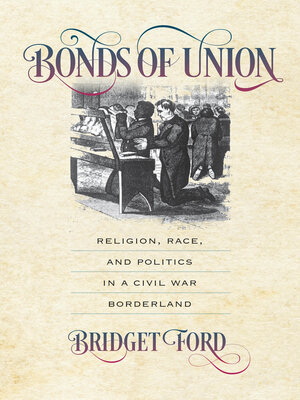Bonds of Union
ebook ∣ Religion, Race, and Politics in a Civil War Borderland · Civil War America
By Bridget Ford

Sign up to save your library
With an OverDrive account, you can save your favorite libraries for at-a-glance information about availability. Find out more about OverDrive accounts.
Find this title in Libby, the library reading app by OverDrive.



Search for a digital library with this title
Title found at these libraries:
| Library Name | Distance |
|---|---|
| Loading... |
This vivid history of the Civil War era reveals how unexpected bonds of union forged among diverse peoples in the Ohio-Kentucky borderlands furthered emancipation through a period of spiraling chaos between 1830 and 1865. Moving beyond familiar arguments about Lincoln’s deft politics or regional commercial ties, Bridget Ford recovers the potent religious, racial, and political attachments holding the country together at one of its most likely breaking points, the Ohio River.
Living in a bitterly contested region, the Americans examined here — Protestant and Catholic, black and white, northerner and southerner — made zealous efforts to understand the daily lives and struggles of those on the opposite side of vexing human and ideological divides. In their common pursuits of religious devotionalism, universal public education regardless of race, and relief from suffering during wartime, Ford discovers a surprisingly capacious and inclusive sense of political union in the Civil War era. While accounting for the era’s many disintegrative forces, Ford reveals the imaginative work that went into bridging stark differences in lived experience, and she posits that work as a precondition for slavery’s end and the Union’s persistence.
Living in a bitterly contested region, the Americans examined here — Protestant and Catholic, black and white, northerner and southerner — made zealous efforts to understand the daily lives and struggles of those on the opposite side of vexing human and ideological divides. In their common pursuits of religious devotionalism, universal public education regardless of race, and relief from suffering during wartime, Ford discovers a surprisingly capacious and inclusive sense of political union in the Civil War era. While accounting for the era’s many disintegrative forces, Ford reveals the imaginative work that went into bridging stark differences in lived experience, and she posits that work as a precondition for slavery’s end and the Union’s persistence.







